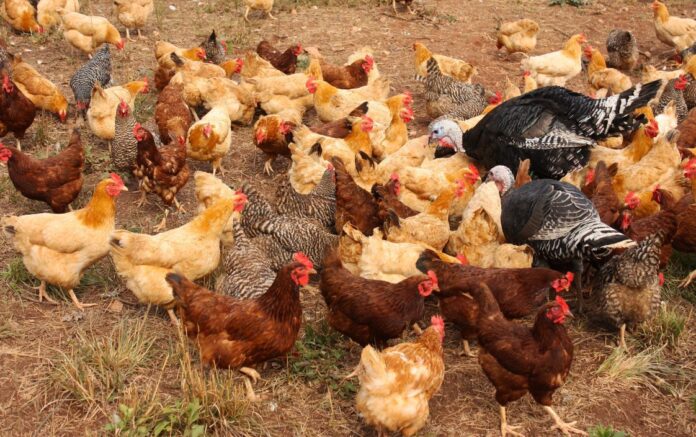AUBURN UNIVERSITY, Ala. — The Alabama Department of Agriculture and Industries (ADAI) confirmed two cases of highly pathogenic avian influenza (HPAI) Dec.16. The disease was detected in a Cullman County commercial broiler farm and a backyard flock in Pickens County.
Rick Pate, the ADAI commissioner, and Dr. Tony Frazier, the state veterinarian, released the following joint statement: “It is critical for commercial and backyard poultry operations to remain alert and closely monitor the health of their poultry. The detection of HPAI in Cullman and Pickens counties reinforces the need to continue following strict biosecurity measures, including keeping birds enclosed without access to wild birds or other domestic flocks.”
What is HPAI?
Carried by migratory waterfowl, HPAI is a highly virulent disease that can cause high mortality. Because Alabama is located between two major migratory flyways, this disease can easily transmit to backyard and commercial poultry flocks in the state.
Dr. Maggie Thompson, the Alabama Cooperative Extension System’s poultry veterinarian, said if the virus is detected in domestic poultry, the entire flock must be promptly and humanely euthanized and the area quarantined.
“While there may be a lot of speculation as to the origin of this virus, it is important to realize that this disease circulates in wild, migratory waterfowl and detections occur almost every year during the migratory seasons,” Thompson said.
While HPAI cases do occur most years, consumers do not have to worry about the safety of poultry meat, because HPAI-infected poultry does not enter the food supply.
Symptoms and transmission
In poultry, HPAI presents itself through several symptoms, including sneezing, gasping for air, coughing, nasal discharge, watery and green diarrhea, fatigue and a poor appetite. Thompson said most often, the only clinical sign observed is sudden, unexplained death.
The virus can be transmitted in several ways. Infected birds can shed the virus in secretions from the mouth, nostrils and eyes. They can also excrete the virus in their fecal droppings, which is a common source of environmental contamination and spread. If a backyard poultry owner suspects their flock has contracted HPAI, they should contact the Alabama state veterinarian’s office at 334-240-7253.
Biosecurity measures crucial
Thompson said implementing strict biosecurity measures is the key to preventing and stopping the spread of HPAI in both backyard and commercial poultry flocks.
“Be mindful that many backyard and commercial poultry producers in Alabama are also beef cattle producers,” Thompson said. “Cattle-watering ponds, frequently visited by migratory waterfowl, are often present in the immediate vicinity of domestic poultry. This highlights the need for vehicle and boot sanitizing stations, as well as poultry-house-dedicated footwear. It is important not to drive vehicles and/or walk around ponds and then enter poultry facilities.”
Backyard poultry growers should also take extreme caution when attending poultry exhibitions, swaps, auctions and other events, particularly in areas where the HPAI infection status is unknown. The following are some basic biosecurity guidelines to protecting poultry flocks:
- Isolate poultry from other animals and protect poultry from wild bird access
- Keep surrounding areas clean and uninviting to wild birds
- Restrict/minimize human access to poultry flocks
- Utilize disinfection stations to sanitize footwear between houses
- Disinfect all equipment entering and leaving the farm. Do not share equipment between farms.
- Sanitize houses and coops in between flocks
- Have an all-in/all-out policy when adding and/or removing birds
- Dispose of bedding material and mortality properly
More information
Whether raising a commercial or backyard flock, implementing a strong biosecurity program is important for maintaining the health and well-being of the birds. More details about HPAI and poultry biosecurity are in the following Alabama Extension publications at www.aces.edu:
- Avian Influenza FAQ (www.aces.edu/blog/topics/poultry/avian-influenza-faq)
- Biosecurity for Backyard Poultry Flocks (www.aces.edu/blog/topics/farming/biosecurity-for-backyard-poultry-flocks)
- Protecting Backyard Flocks (www.aces.edu/blog/topics/poultry/protecting-backyard-flocks)
- Submitting Samples to Alabama Diagnostic Laboratories (www.aces.edu/blog/topics/farming/submitting-samples-to-alabama-diagnostic-laboratories)






























